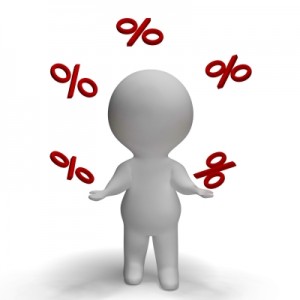Are you planning to buy a house or rent one? If so, then you need to be sure you have a decent credit score. If you have a lot of credit card debt here is a personal finance strategy to help manage both your debt and your credit score.
Using Personal Loans to Reduce Debt
 A personal loan is an unsecured loan just like credit cards that can help you to restructure your existing credit card debt. You may opt for this method of debt relief, if you can get a reduced monthly payment, an extended loan term or a reduced rate of interest on the personal loan as compared to the credit cards.
A personal loan is an unsecured loan just like credit cards that can help you to restructure your existing credit card debt. You may opt for this method of debt relief, if you can get a reduced monthly payment, an extended loan term or a reduced rate of interest on the personal loan as compared to the credit cards.
Personal loans, usually, have a loan term of 4 to 5 years. Often they have a lower rate of interest than credit cards do. So they have the potential to lower the overall cost of interest on your credit card balances. With a good credit history, you may get a personal loan at a more affordable rate of interest than what you currently have on your credit cards. A recent check found interest rates on personal loans at just under 10% so if you are currently paying 18% on your credit cards you could theoretically save 8% by taking out a personal loan.
Another advantage of a personal loan is that they have a fixed term, so you won’t be tempted to pay just the minimum, instead you will have to pay a certain amount every month and you will know your debt will be gone at the end of the term. And because you are paying a lower interest rate the monthly payment may be roughly the same or even less.
How do you make the repayments?
When you first initiate the loan, the monthly loan repayment amount will be determined on the basis of your loan’s remaining balance, its maturity term and the rate of interest. So you will be told an exact amount that is due on a certain day each month. Combining multiple credit card balances into one personal loan will reduce your monthly paperwork burden, since you will only need to make one payment and it will be the same every month so you can schedule it in automatic bill pay.
How does it affect your credit?
Having all your cards consolidated through a personal loan will have limited impact on your credit since the total balance owed is still the same. However, when you are trying to buy a house or rent one, a single personal loan may look better than a bunch of maxed out credit cards because it will free up the available balances on your credit cards. However, on the flip side, your credit report will show a current credit inquiry that is related to the personal loan. The key of course is to not use this as an opportunity to start running up credit card balances again. Once the balances are transferred to the personal loan you must get into the habit of paying off all the entire credit card balance every month. That is, any new charges made that month, in addition to making the personal loan payment. If you can’t make both these payments you are living beyond your means and you will never get out of debt.
But, if you can stay within your means, then consolidating your credit cards with a personal loan may be an option to help you get out of debt faster.
What are the Precautions to Take?
First of all, you need to evaluate how much monthly debt payment you can afford based on an analysis of your current financial health. This includes your monthly discretionary and nondiscretionary expenses.
You’ll have to allocate proper funds for discretionary costs like restaurant bills, newspaper/magazine subscriptions, cell phone bills, etc. and non-discretionary costs like mortgage payments, insurance premiums, utilities, etc. In order to do that, you can use various online debt calculators.
Secondly, you need to be sure you can cover all your monthly expenditures. One way to do this is to use cash exclusively until you get used to living within your means. If you don’t have the cash you can’t buy it. Keep only one Credit Card with you just for emergencies. (And a sale on that new gadget or handbag is not an emergency!) If you don’t have the will-power (i.e. won’t power) you might have to cut up the cards or freeze them in a block of ice in the freezer so you are less likely to spend on the spur of the moment.
Third and finally, shop around well before closing a deal with a personal loan lender. Get quotes from various lenders and compare their rates as well as loan terms. Choose the one that fits the bill with respect to your present financial requirements.
See Also:
- Ending Credit Card Debt … Choosing The Right Option
- Poor Credit Mortgages- Subprime Lending
- Using personal loans to pay off credit card debt
- Acquiring Credit and Credit Reports
Image courtesy of Stuart Miles / FreeDigitalPhotos.net.


It’s all good that you manage to pay down credit card debt… but did you check to see if you owed anything to start with?
Just because you had a credit card (CC) doesn’t mean you owe the amount the bank claims you do. Has anybody ever asked why the bank never sends you a bill or an invoice for your CC payment? Nope?
Funny how they only ever send a STATEMENT OF ACCOUNT. A statement is like this… “You have used $100″… or “Your account is -$100” This is not an invoice or a bill.
You have NEVER been billed by the bank because the bank never lent you anything, so they have nothing to bill you for.
The credit you “borrowed” from the bank was yours all the time. You created it when you made the application for the account. Make sure you know what money and credit really are before trying to say that isn’t so. Think of a check, you have an amount, a signature and a date…. didn’t your application have all of those? So why do people think that the bank didn’t use the application as a check? Google “promissory note” to find out why this is so.
The truth is that you have not borrowed a single cent from the bank and all you have done is pay the bank the amount you (think) you owed plus interest.
The fastest and cheapest way to “pay off” CC debt is to just stop paying it. Let the account default and have a debt collector buy the debt. Then the bank will discharge the debt, meaning you no longer owe the bank anything. As you will have no contract with the debt collector that you agreed to pay them anything you are under no obligation to pay them a cent.
CC debt free for the price of a stamp or two.